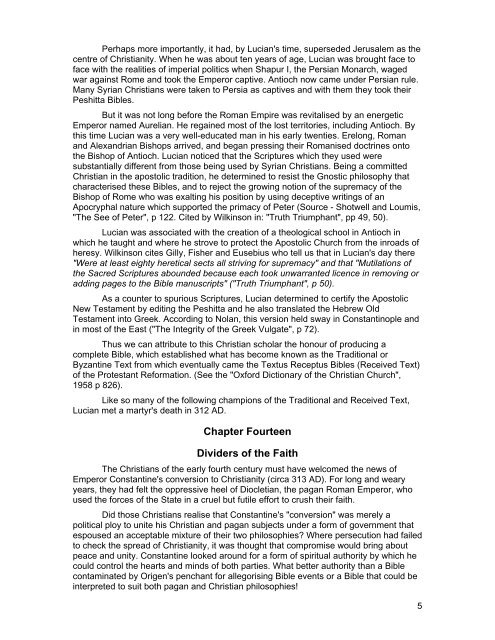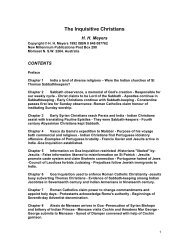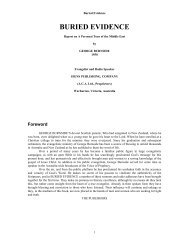Battle of the Bibles - Present Truth
Battle of the Bibles - Present Truth
Battle of the Bibles - Present Truth
Create successful ePaper yourself
Turn your PDF publications into a flip-book with our unique Google optimized e-Paper software.
Perhaps more importantly, it had, by Lucian's time, superseded Jerusalem as <strong>the</strong><br />
centre <strong>of</strong> Christianity. When he was about ten years <strong>of</strong> age, Lucian was brought face to<br />
face with <strong>the</strong> realities <strong>of</strong> imperial politics when Shapur I, <strong>the</strong> Persian Monarch, waged<br />
war against Rome and took <strong>the</strong> Emperor captive. Antioch now came under Persian rule.<br />
Many Syrian Christians were taken to Persia as captives and with <strong>the</strong>m <strong>the</strong>y took <strong>the</strong>ir<br />
Peshitta <strong>Bibles</strong>.<br />
But it was not long before <strong>the</strong> Roman Empire was revitalised by an energetic<br />
Emperor named Aurelian. He regained most <strong>of</strong> <strong>the</strong> lost territories, including Antioch. By<br />
this time Lucian was a very well-educated man in his early twenties. Erelong, Roman<br />
and Alexandrian Bishops arrived, and began pressing <strong>the</strong>ir Romanised doctrines onto<br />
<strong>the</strong> Bishop <strong>of</strong> Antioch. Lucian noticed that <strong>the</strong> Scriptures which <strong>the</strong>y used were<br />
substantially different from those being used by Syrian Christians. Being a committed<br />
Christian in <strong>the</strong> apostolic tradition, he determined to resist <strong>the</strong> Gnostic philosophy that<br />
characterised <strong>the</strong>se <strong>Bibles</strong>, and to reject <strong>the</strong> growing notion <strong>of</strong> <strong>the</strong> supremacy <strong>of</strong> <strong>the</strong><br />
Bishop <strong>of</strong> Rome who was exalting his position by using deceptive writings <strong>of</strong> an<br />
Apocryphal nature which supported <strong>the</strong> primacy <strong>of</strong> Peter (Source - Shotwell and Loumis,<br />
"The See <strong>of</strong> Peter", p 122. Cited by Wilkinson in: "<strong>Truth</strong> Triumphant", pp 49, 50).<br />
Lucian was associated with <strong>the</strong> creation <strong>of</strong> a <strong>the</strong>ological school in Antioch in<br />
which he taught and where he strove to protect <strong>the</strong> Apostolic Church from <strong>the</strong> inroads <strong>of</strong><br />
heresy. Wilkinson cites Gilly, Fisher and Eusebius who tell us that in Lucian's day <strong>the</strong>re<br />
"Were at least eighty heretical sects all striving for supremacy" and that "Mutilations <strong>of</strong><br />
<strong>the</strong> Sacred Scriptures abounded because each took unwarranted licence in removing or<br />
adding pages to <strong>the</strong> Bible manuscripts" ("<strong>Truth</strong> Triumphant", p 50).<br />
As a counter to spurious Scriptures, Lucian determined to certify <strong>the</strong> Apostolic<br />
New Testament by editing <strong>the</strong> Peshitta and he also translated <strong>the</strong> Hebrew Old<br />
Testament into Greek. According to Nolan, this version held sway in Constantinople and<br />
in most <strong>of</strong> <strong>the</strong> East ("The Integrity <strong>of</strong> <strong>the</strong> Greek Vulgate", p 72).<br />
Thus we can attribute to this Christian scholar <strong>the</strong> honour <strong>of</strong> producing a<br />
complete Bible, which established what has become known as <strong>the</strong> Traditional or<br />
Byzantine Text from which eventually came <strong>the</strong> Textus Receptus <strong>Bibles</strong> (Received Text)<br />
<strong>of</strong> <strong>the</strong> Protestant Reformation. (See <strong>the</strong> "Oxford Dictionary <strong>of</strong> <strong>the</strong> Christian Church",<br />
1958 p 826).<br />
Like so many <strong>of</strong> <strong>the</strong> following champions <strong>of</strong> <strong>the</strong> Traditional and Received Text,<br />
Lucian met a martyr's death in 312 AD.<br />
Chapter Fourteen<br />
Dividers <strong>of</strong> <strong>the</strong> Faith<br />
The Christians <strong>of</strong> <strong>the</strong> early fourth century must have welcomed <strong>the</strong> news <strong>of</strong><br />
Emperor Constantine's conversion to Christianity (circa 313 AD). For long and weary<br />
years, <strong>the</strong>y had felt <strong>the</strong> oppressive heel <strong>of</strong> Diocletian, <strong>the</strong> pagan Roman Emperor, who<br />
used <strong>the</strong> forces <strong>of</strong> <strong>the</strong> State in a cruel but futile effort to crush <strong>the</strong>ir faith.<br />
Did those Christians realise that Constantine's "conversion" was merely a<br />
political ploy to unite his Christian and pagan subjects under a form <strong>of</strong> government that<br />
espoused an acceptable mixture <strong>of</strong> <strong>the</strong>ir two philosophies? Where persecution had failed<br />
to check <strong>the</strong> spread <strong>of</strong> Christianity, it was thought that compromise would bring about<br />
peace and unity. Constantine looked around for a form <strong>of</strong> spiritual authority by which he<br />
could control <strong>the</strong> hearts and minds <strong>of</strong> both parties. What better authority than a Bible<br />
contaminated by Origen's penchant for allegorising Bible events or a Bible that could be<br />
interpreted to suit both pagan and Christian philosophies!<br />
5





